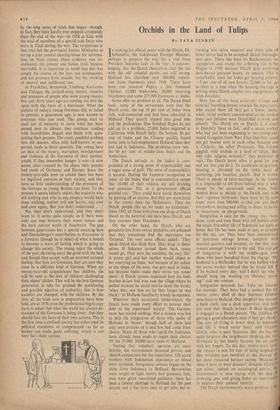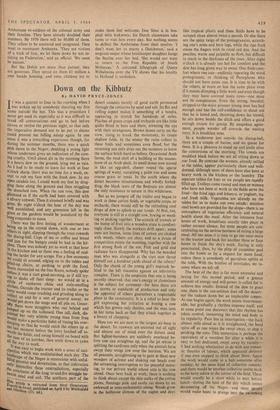Orchids in the Land of Tulips
By TAYA
ZINKIN
TN making his official peace with the Dutch, Dr. ISubandrio, the Indonesian Foreign Minister, perhaps to prepare the way for a visit from President Sukarno later in the year, is acknow- ledging, like the Dutch themselves, that the ties with the old colonial power are still strong. Holland has absorbed over 300,000 repatri- ates from Indonesia since 1949. There have been, one hundred Papus, a few thousand Chinese, 12,000 Amboinese, 30,000 returning Dutchmen and some 275,000 Eurasians or Indos.
Some offer no problem at all. The Dutch fitted back, many of the servicemen went into the Dutch army; the top 10 per cent of Indos were rich, well-connected and had been educated in Holland. They quietly slipped into good jobs and the professions. One hundred Papus do not add up to a problem; 25,000 Indos migrated to California with Dutch help; the bottom 30 per cent of Indos and the Chinese quickly found better jobs in full-employment Holland than they had had in Indonesia. The problems were two: the 60 per cent of middle-class Indos and the Amboinese.
The Dutch attitude to the Indos is com- pounded of a strong sense of responsibility and a vague sense of guilt. The sense of responsibility is natural. During the Japanese occupation so many of the Indos died in concentration camps that 10,000 of their widows are still drawing war pensions. Yet, as a government official pointed out: 'They could have saved themselves by passing off as natives. But they are more loyal to the crown than the Hollanders. They are Dutch, people like us, we make no distinction.' Since 1892 all those with even one drop of Dutch blood on the paternal side have been Dutch; and they treasure their Dutchness.
On the other hand, the Dutch, who are genuinely free from colour prejudice, are ashamed that they sometimes find the repatriates too 'Oriental.' The very same official added: 'They speak Dutch but think East. They keep to them- selves. If Sukarno ,invited them back, many would go. They miss the sunshine, the easy life.' A pretty girl said her mother would object to her marrying an Indo, 'not because of his colour or the shape of his nose, one gets used to looks, but because Indos make their wives run round them.' A Dutch tycoon explained how his Indo brother-in-law had won over the village where he settled because he could out-ice-skate the locals; 'when they saw him on ice they forgot he was black!' In Holland familiarity breeds acceptance.
Whatever their occasional ambivalance, the Dutch have made every effort to honour their debt to the repatriates' loyalty. The Govern- ment has stinted nothing. Not a minute was lost to help the integration of those who spoke of Holland as 'home,' though half of them had only seen pictures of it and few had come from choice. Many of those who opted for Indonesia have already been made to regret their choice. Of the 37,000, 10,000 have come to Holland.
Feeling that voluntary agencies are more flexible, the Government financed private and church committees for the repatriates; 120 social workers with Indonesian experience or blood were recruited. Integration courses began on the ships from Indonesia to Holland. Housewives were taught to light stoves, boil potatoes, knit; men were given vocational guidance; there has been a labour shortage in Holland for the past decade and it has been easy to get jobs, but re-
training was often required and often jobs of lower status had to be accepted. Dutch thorough- ness pays. There has been no Rachmanism, no segregation and, except for a fleeting riot in the Hague in 1958 because Dutch girls preferred dark-haired guitared beaux, no tension. This is remarkable, since the Indos get housing priority —5 per cent of all new houses, 22,000 so far, go to them at a time when the housing shortage is driving many Dutch couples into engagements of Irish duration.
How has all this been achieved? Camps and 'contract boarding-houses awaited the repatriates, who stayed there till they got a home; mean- while, social workers concentrated on the women (men and children were Dutchified at work and school). 'The Dutch are so Dutch, it is eruct to Dutchify them so fast,' said a social worker who had just been explaining to two young ani- mated Gauguins from West Irian that they could not get houses next to each other because one is Catholic, the other Protestant. The friends giggled, wild Orchids in a land of tulips, 'But why take religion seriously?' they protested in vain. The Dutch know what is good for you and 'see that you do it. To accelerate integration, housing is allocated on the treble basis of scattering, jab location, parish. And it works. There is plenty of inter-marriage. In the street it is impossible to tell from behind who is wha except for the occasional male beats. Ind° women dress as plainly as the Dutch and, with their vigorous birth-rate, there must be by now many more than 300,000, so that one sees their) everywhere, buying and selling in shops, in parks, in restaurants, on playgrounds.
Integration is easy for the young; they twist skate, cycle and even thoSe who still hanker after the easier, friendlier life of Indonesia are quite at home. But life has been made as easy as possible for the old, too. They have been concentrated in luxurious old-age homes, complete with married quarters and hospital, so that they may remain amongst friends to the end. The real job of integration is with the middle-aged, even those who have benefited from the change. 'my husband is a Hollander, but he was baffled when the social worker insisted that he would fall ill if he bathed every day; and I don't see why I should hang my washing on Monday morn ing!' said one woman.
Integration proceeds fast. Take the Glorie! for example. They have had a council flat fo twelve years. Half of their fourteen children were born in Holland. One daughter has married a bank clerk, one a dock supervisor, and both live with their Dutch in-laws. A third daughte is engaged to a Dutch parson. The children are getting a good education, even if they get clice0 The cost of living is lower than in Indonesia and life is much easier here,' said Grannie Glorie, who is pure Sudanese. But she has not quite forgiven the neighbours thinking she Nva5 ill-treated by her family because she ate curd with her lingers. To this day, twelve years later refuses to mix for fear of being laughed al' not alone; indeed, on sociological advice. the Government is now toying with the idea of reversing gear and giving Indos an opporttinitY Her wrinkled eyes twinkled as she showed Ile her most treasured batique sarong. 'Because of them I have to wear dresses!' Grannie Glorie is
to express their cultural identity. The Dutch Government's worst problem k o t-1,' Amboinese ex-soldiers of the colonial army and their families. They have already doubled their numbers. By 1970 there will be 40,000 of them. They refuse to be scattered and integrated. They want to reconquer Amboyna. 'They are victims of a trick of fate, we let them down by not in- sisting on Federation,' said an official. `We must be patient.'
But the Dutch are more than patient, they are generous. They spend on them fl million a year beside housing; and even children try to make them feel welcome. Jose Sinai is in hos- pital with leukemia; his Dutch classmates take turns to visit him every day. But nothing seems to deflect the Amboinese from their resolve. `I don't want her to marry a Dutchman,' said a sergeant-major whose bookkeeper daughter hangs the Beatles over her bed. `She would not want to return to the Free Republic of South Moluccas.' A coloured lithograph of Queen Wilhelmina over the TV shows that his loyalty to Holland is unshaken.



































 Previous page
Previous page